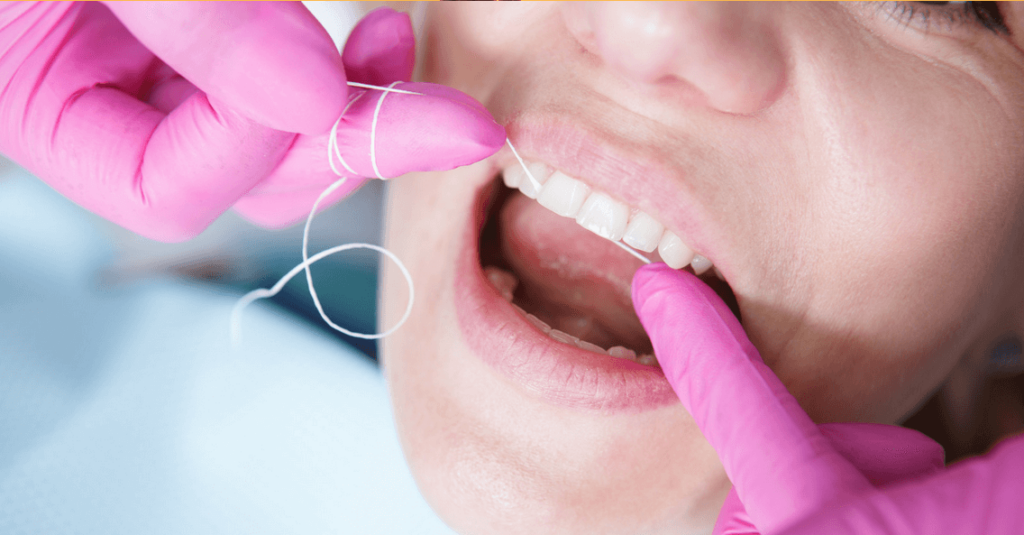Healthy gums are the foundation for a strong set of teeth and an integral aspect of our overall well-being. Yet, despite their importance, gum care often gets overshadowed by the emphasis on keeping teeth bright and cavity-free. This oversight can lead to serious oral health issues, as maintaining healthy gums is intrinsically connected to the condition of your teeth and your broader health. Gum disease, if left unchecked, can lead to discomfort, swelling, and the severe consequence of tooth loss. Furthermore, there’s increasing evidence suggesting links between periodontal disease and other systemic health conditions, such as cardiovascular disease and diabetes.
Discover the essential steps to maintaining healthy gums, giving your mouth the care and attention it deserves. From daily habits that strengthen your oral hygiene routine to professional dental care, we will explore effective strategies to prevent gum disease and its complications. This piece aims to inform and inspire action towards healthier gums, which are crucial to your overall oral and general well-being.
Understanding Gum Health
What Makes Gums Healthy?
Healthy gums have a firm texture and light pink coloration, indicating good blood circulation and oral hygiene. They fit snugly around the teeth, providing a stable support system critical for dental health. In stark contrast, unhealthy gums often appear red, swollen or might bleed easily, especially during brushing or flossing. These are signs of inflammation, usually signalling the onset of gum disease.
The Role of Gums in Oral Health
Gums are the protective barrier for the roots of your teeth and the supporting bone structure. They are essential in maintaining tooth stability and ensuring that your bite remains even. Healthy gums form a tight seal around each tooth to secure and safeguard against bacterial infections that can lead to dental decay and other oral health issues.
Common Gum Diseases
Gingivitis is the earliest stage of gum disease, often caused by the buildup of plaque on the teeth at the gumline. If not removed through daily brushing and flossing, plaque produces toxins that can irritate gum tissue, leading to gingivitis. Common symptoms include redness, swelling, and gums bleeding during oral care routines.
Periodontitis is the more advanced form of gum disease that can develop if gingivitis is left untreated. In periodontitis, the inner layer of the gum and bone pulls away from the teeth and forms pockets, which can become infected. The body’s immune response to this infection, combined with the toxins from the plaque, starts to break down the connective tissue and bone that hold the teeth in place. Symptoms of periodontitis include receding gums, formation of deep pockets between teeth and gums, and loss of the bone that supports the teeth.
Daily Habits for Maintaining Healthy Gums
Maintaining healthy gums isn’t a complex endeavour but requires consistent daily habits. By following these practices, you can minimize the risk of gum disease and ensure that your gums remain as healthy as your teeth.
Proper Brushing Techniques
Brushing your teeth is a cornerstone of good oral hygiene, but it’s not just about your teeth — it’s also about your gums. To brush effectively, use a soft-bristled toothbrush and fluoride toothpaste, angling the bristles at 45 degrees near the gum line. This ensures both the surface of your teeth and gums are adequately cleaned, removing plaque without being overly abrasive, which can irritate the gums. Circular motions help to clean the teeth and stimulate the gums, promoting blood circulation and health.
The Importance of Flossing

Flossing might seem like a chore, but it’s critical for removing plaque and food particles that a toothbrush can’t reach, especially between teeth and along the gum line. Regular flossing can also prevent tartar buildup, a hardened form of plaque only a dentist can remove. Floss gently to avoid cutting or bruising the gums, and use a clean section of floss for each tooth to prevent redistributing bacteria.
Choosing the Right Toothbrush
When selecting a toothbrush, consider one with soft bristles over stiff bristles to prevent damaging your gums and enamel. Soft bristles are sufficient to clean effectively while gentle on the gum tissue. While both manual and electric toothbrushes can be effective, many find electric toothbrushes easier to use and more effective in reducing plaque and gingivitis. Choose a comfortable toothbrush in your hand and mouth, and replace it every three to four months or sooner if the bristles become frayed.
Using Mouthwash
Incorporating a therapeutic mouthwash into your daily routine can benefit your gum health. Mouthwashes with antibacterial properties can help reduce the level of bacteria that cause plaque and gum disease. Swishing with mouthwash can reach areas that brushing and flossing may miss, lending extra protection to your gums.
Diet and Lifestyle Choices Impacting Gum Health
Nutrition for Healthy Gums
A balanced diet is vital to maintaining healthy gums. Ensure the inclusion of the following foods and vitamins:
- Vitamin C: Crucial for gum health, vitamin C helps to strengthen the immune system and repair tissues. Citrus fruits, strawberries, and leafy greens are excellent sources.
- Calcium: Strengthens the jaw bone, which houses the teeth, thereby supporting the gums. Dairy products, almonds, and green vegetables like broccoli and kale are rich in calcium.
- Phosphorus: Critical for maintaining strong tooth enamel that protects gums, found in foods like fish, pumpkin seeds, and lentils.
- Vitamin D: Helps absorb calcium and reduce inflammatory response in gums. Fatty fish, fortified foods, and sunlight are good sources of vitamin D.
- Antioxidants: Work to repair tissue and reduce inflammation. Berries, nuts, beans, and apples are full of antioxidants.
Lifestyle Factors Affecting Gums
Certain lifestyle factors can negatively impact the health of your gums, including:
- Smoking: One of the most significant risk factors for gum disease, as it weakens the immune system and makes it harder for the body to fight off gum infection.
- Stress: High stress levels can increase the risk of periodontal disease by making it challenging for the body to fight infection.
Hydration and Gum Health
Maintaining adequate hydration is vital for overall health, including the health of your gums. Drinking water plays a critical role in sustaining saliva flow, essential for neutralizing acids produced by bacteria in the mouth. Saliva is also necessary for washing away food particles and debris that could otherwise lodge between teeth and gums, potentially leading to plaque buildup. An optimal hydration level helps keep mucous membranes moist and resilient, allowing the gums to function effectively as a barrier against harmful microbes. So, for your gums and broader oral health, don’t underestimate the power of a tall glass of water.
Recognizing Signs of Gum Disease
Early detection of gum disease can significantly improve the treatment outcome and help maintain your oral health. While good oral hygiene practices can prevent most gum diseases, knowing the early warning signs and symptoms is essential.
Early Warning Signs
Be vigilant for changes that could indicate the onset of gum disease, such as:
- Bleeding: Gums bleeding during brushing or flossing is not normal and is often one of the first signs of gingivitis.
- Swelling: Swollen or puffy gums could indicate inflammation, a sign that your body is fighting off an infection.
- Receding Gums: If your teeth appear longer than usual, it may be due to your gums receding, a potential sign of progressing periodontitis.
- Persistent Bad Breath: Chronic bad breath or a bad taste in the mouth may signify the presence of bacteria under the gumline.
- Sensitivity or Pain: Increased sensitivity to hot or cold and discomfort when chewing may be related to gum disease.
When to See a Dentist
Regular dental checkups are critical for catching gum disease before it becomes severe. Dentists typically recommend checkups and cleanings every six months. Still, some individuals may require more frequent visits, especially if they have risk factors for gum disease, such as smoking or diabetes. If you notice any early warning signs, make an appointment with your dentist as soon as possible. Early intervention is the key to reversing damage and preventing more severe problems.
Professional Gum Care
In addition to at-home oral hygiene, professional gum care is crucial in maintaining gum health and preventing periodontal disease.
Routine Dental Cleanings
Professional dental cleanings, performed by a dentist or dental hygienist, are a critical preventive measure for controlling plaque and tartar buildup — the primary culprits of gum disease. These cleanings go beyond what can be achieved at home by using specialized tools to remove tartar (calcified plaque) that cannot be brushed or flossed away. Regular professional cleanings typically recommended twice a year, can help prevent the progression of gum disease and maintain overall oral health.
Deep Cleaning Treatments
Deep cleaning treatments are necessary when gum disease advances past the initial gingivitis stage. This usually involves scaling and root planing, where plaque and tartar below the gum line are removed, and the tooth roots are smoothed. These procedures can help reduce gum inflammation and pocket depth, helping the gums reattach firmly to the teeth surfaces.
Advanced Gum Disease Treatments
For more severe cases of periodontal disease, a range of surgical and non-surgical treatments may be necessary. Non-surgical options include laser treatment to remove the affected tissue. In contrast, surgical treatments can involve flap surgery to reduce pocket size, bone grafting for bone lost to periodontitis, or soft tissue grafts to combat gum recession. It’s vital to consult with a dental professional to determine the best course of action for advanced gum disease.
The Link Between Gum Health and Overall Health
Gum Disease and Systemic Health Issues
Our gum health can be a window to our overall well-being. Research has uncovered a perceivable link between periodontal diseases and systemic health issues such as cardiovascular disease, diabetes, and stroke. For example, the inflammation caused by periodontal disease is suspected to elevate the risk of heart disease and can worsen the condition in those already diagnosed. Furthermore, gum disease is often considered a complication of diabetes, as it can affect blood glucose control and contribute to the progression of diabetes.
Preventive Care as Preventive Medicine
Investing in our oral health is a form of preventive medicine. Maintaining healthy gums can stave off or mitigate systemic conditions, ultimately reducing healthcare costs and improving quality of life. Regular dental checkups, good oral hygiene, and a balanced diet are critical preventive care components. As we promote gum health, we ensure a bright smile and support our body’s overall defence system, making it a cost-effective strategy for maintaining long-term health.
Conclusion
Maintaining healthy gums is more than just a commitment to oral hygiene; it is fundamental to preserving overall health and enhancing personal confidence. The cascade of complications stemming from gum disease underscores the critical nature of gum health, not just for a radiant smile but for a healthier life. We encourage readers to actively adopt a consistent oral hygiene routine, embrace a nutritious diet, and not overlook the importance of hydration for maintaining optimal gum health. Furthermore, the necessity for regular dental checkups and professional cleanings cannot be overstated; these practices are quintessential in detecting issues early on and preventing the progression of gum disease. By taking concerted steps towards preserving the integrity of your gums, you’re investing in a future filled with robust health and unshakeable confidence in your smile. Make gum health a priority—your body and mind will thank you.
Schedule your appointment today with Mirror Lake Dental in Camrose, AB, to ensure your smile remains bright and healthy. If you have questions or need further information before your visit, please do not hesitate to reach out through our Contact Form.





